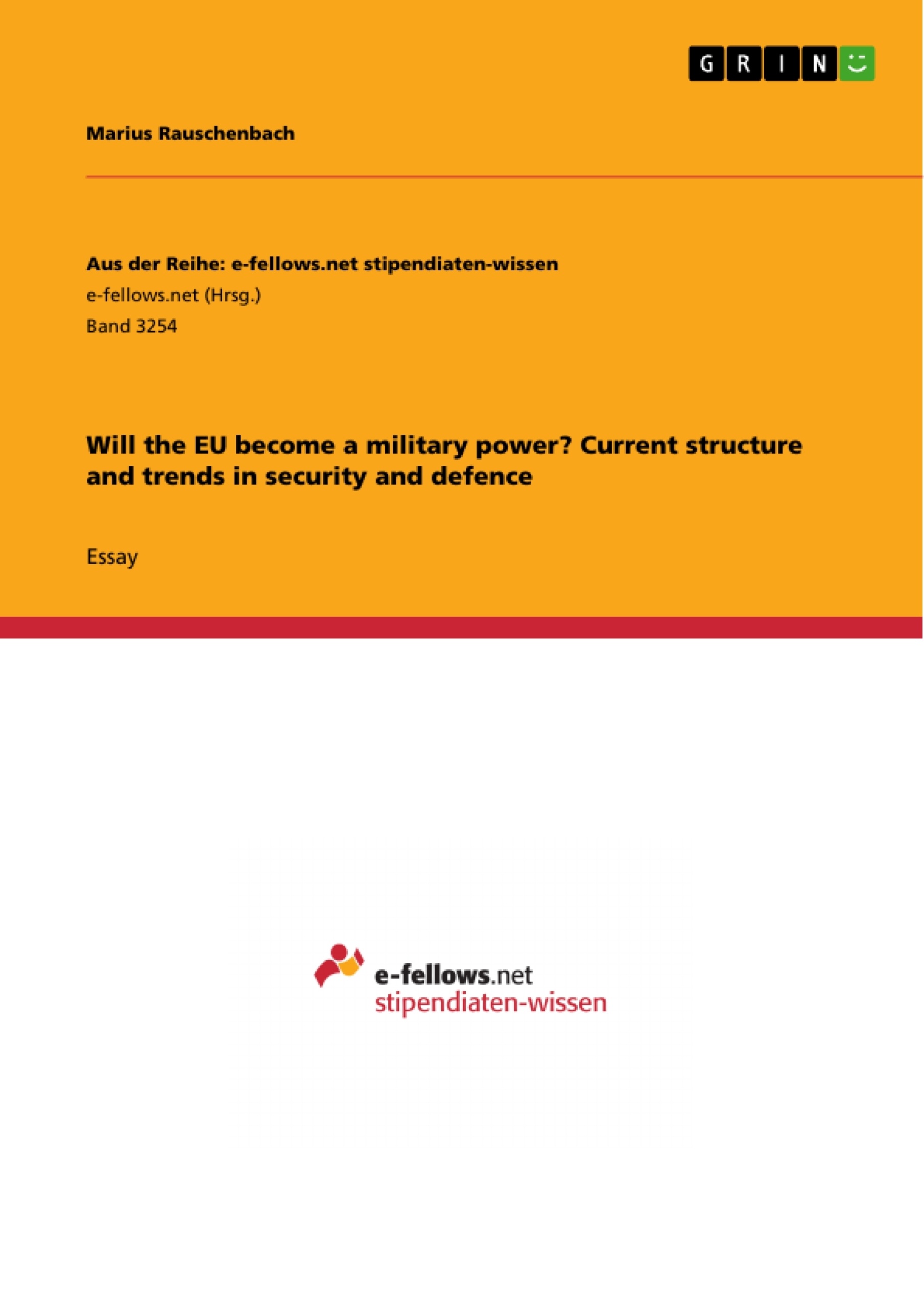The European Union is the institutionalized result of an ongoing process of cooperation between European nation states that started as consequence of the Second World War. It is a unique kind of supranational cooperation, a ‘sui generis’ in international politics, and evolved in incremental steps, which are unforeseeable and therefore hard to theorise.
This essay aims to answer the question if the EU will become a military power. In order to forecast a possible future scenario, we must take into account historical events and decisions that shaped the current structure of the EU, especially in regards to security and defence. We must also consider wider developments and trends, and identify what has prevented the EU evolving into a military power so far. Afterwards, the essay will outline recent events and decisions in security and defence field. Based on these facts, the assessment about the EU as military power can be made.
Inhaltsverzeichnis (Table of Contents)
- Historical development
- The aftermath of WWII
- External events and influences
- Cause analysis
- Recent situation
Zielsetzung und Themenschwerpunkte (Objectives and Key Themes)
This essay seeks to assess the likelihood of the European Union becoming a significant military power. To do so, it analyzes the historical development of the EU, particularly in relation to security and defense, identifying key factors that have hindered the EU's evolution into a military force. Additionally, the essay examines recent events and decisions in the security and defense arena, providing a framework for assessing the potential of the EU as a military power.
- The evolution of EU security and defence cooperation in the post-WWII era.
- Obstacles to the development of a unified EU military power.
- The impact of recent external events and challenges on EU security and defence policy.
- The potential for the EU to overcome historical constraints and develop a stronger military capability.
- The role of national interests, strategic cultures, and geopolitical factors in shaping EU defence policy.
Zusammenfassung der Kapitel (Chapter Summaries)
The first section of the essay outlines the historical development of the European Union's security and defence policy, tracing its origins back to the aftermath of WWII and the creation of supranational organisations like the European Defense Community (EDC). It examines the impact of key events and decisions, including the failed EDC project, the creation of the Common Foreign and Security Policy (CFSP), and the evolution of the European Security and Defence Policy (ESDP). The chapter highlights the enduring influence of traditional Westphalian sovereignty and the competing national interests that have impeded the development of a unified EU military force.
The second chapter delves into the underlying reasons for the EU's limited role in security and defence. It identifies several factors, including the preservation of national power and interests by member states, the intergovernmental nature of EU foreign policy, and the diversity of strategic cultures and military conceptions among member states. The chapter also highlights the role of NATO, the dominance of US security interests in Europe, and the limited influence of the European Commission in the CFSP.
The third section examines recent events and developments that have influenced EU security and defence policy. It focuses on the impact of conflicts in Syria and Ukraine, the rise of transnational terrorism, and the emergence of hybrid threats. The chapter highlights the growing recognition of the need for a more proactive and unified EU response to these challenges and explores the potential for closer cooperation within the EU in the aftermath of Brexit. It also discusses the impact of Donald Trump's presidency on the transatlantic security landscape and the need for European states to reassess their strategic positioning and military capabilities.
Schlüsselwörter (Keywords)
The essay explores the complexities of European security and defence policy, focusing on key themes such as the development of a unified EU military power, the challenges of national sovereignty and strategic cultures, the impact of external events and influences, and the role of NATO and US security interests in Europe. Key concepts include Westphalian sovereignty, intergovernmentalism, the Common Foreign and Security Policy (CFSP), the European Security and Defence Policy (ESDP), hybrid threats, and the potential for strategic autonomy for the EU.
Frequently Asked Questions
Will the EU ever become a military power?
The essay assesses this possibility by analyzing historical obstacles, such as national sovereignty, and recent trends like the rise of hybrid threats.
What is the Common Foreign and Security Policy (CFSP)?
The CFSP is the organized, agreed foreign policy of the European Union, which has evolved through various treaties but remains largely intergovernmental.
How has Brexit impacted EU defense policy?
The departure of the UK, a major military power, has led to a reassessment of European defense cooperation and a push for more strategic autonomy among the remaining members.
What role does NATO play in European security?
NATO remains the primary framework for collective defense in Europe, often creating a tension between transatlantic reliance and the desire for independent EU military capabilities.
What are "hybrid threats" in the context of the EU?
Hybrid threats include non-traditional security challenges like cyberattacks, disinformation campaigns, and transnational terrorism that require a unified EU response.
- Quote paper
- Marius Rauschenbach (Author), 2018, Will the EU become a military power? Current structure and trends in security and defence, Munich, GRIN Verlag, https://www.grin.com/document/495892



